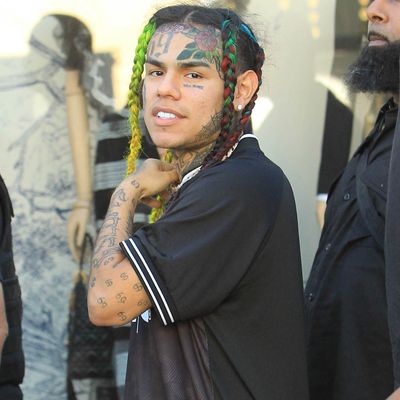
Tekashi 6ix9ine has been released from federal lockup early and will serve the remaining four months of his sentence on home confinement because of coronavirus concerns, Manhattan federal-court filings revealed on Thursday — the latest unexpected turn in the controversial Brooklyn rapper’s legal saga. Judge Paul Engelmayer decided to release him after his attorneys voiced concerns that his asthma made him particularly vulnerable to COVID-19, which is presently spreading through many U.S. jails and prisons. The “FEFE” rapper, real name Daniel Hernandez, was originally set to leave jail around early August.
Engelmayer had made his decision Wednesday, but it wasn’t made public immediately. Prosecutors, who didn’t oppose releasing Hernandez, had asked for Engelmayer to delay posting the decision “to allow law-enforcement agents to ensure that Mr. Hernandez is transported safely and securely from the facility where he is currently housed to a residential address previously approved by the Probation Department …”
Here’s everything we know about what Hernandez’s release means for the immediate future of his life and career.
Where will Tekashi be confined?
Dawn Florio, one of Hernandez’s attorneys, told Vulture that she can’t give details on where he will be staying. Court documents indicate, however, that he will live “at an address approved by the defendant’s probation officer.”
Can he use social media?
In addition to getting released from jail early, there is even more good news for Hernandez, given how Instagram propelled him to fame: He can probably go on social media again. “I don’t know of any restrictions that would prevent him from going on social media,” Florio said. (As of publication, Hernandez has not posted anywhere.)
Can he leave the house?
“Home confinement” means that Hernandez can’t leave the house “except for legal visits and medical appointments,” Florio said. If Hernandez wants to leave, his probation officer has to give him permission. “He can’t go to the grocery store or anything like that,” Florio explained. “It’s like being in jail, except that it’s at home.” Think house arrest: You can’t leave home without authorization.
Can he have visitors?
Right now, because of coronavirus-related social distancing, nobody should be hanging out outside their homes. So, Hernandez shouldn’t have visitors for the same reasons nobody else should. If social distancing weren’t an issue, however, family members could typically visit people on house arrest. Even after social distancing ends, Hernandez won’t be able to associate with other felons, which is pretty standard in criminal matters.
Can Tekashi drop music right now?
Hernandez reportedly inked a $10 million two-album record deal with his former label, 10K Projects, while he was awaiting sentencing. Florio said he is permitted to release music.
Is he going to start making music right away?
Yes, Florio said. “He may even be allowed to go to a studio to work; that’s being worked out with his probation officer,” she said. “Whether or not he’ll be able to go to a studio to record … right now, everything is closed with the virus.” She added, “Hopefully, maybe he can build one where he’s staying.”
Does he have to wear an ankle monitor?
In the decision granting Hernandez “compassionate release,” Engelmayer said that his home incarceration “will be enforced by GPS monitoring.” (Generally speaking, GPS monitoring involves an ankle monitor.) If Hernandez’s probation officers can’t set up the GPS monitoring right away, Hernandez must “have daily contact with the defendant’s probation officer through videoconferencing technology until GPS monitoring is implemented,” Engelmayer said.
What happens when he’s on supervised release?
After Hernandez serves his sentence, he is going to be on “supervised release” for five years — which basically means he needs to stay out of trouble and follow the law to remain free. Florio said that Hernandez hasn’t received all of the rules of his supervised release yet.
Will Tekashi go into witness protection?
Federal prosecutors had previously said witness protection might be necessary because of Hernandez’s extensive snitching, but he’s still not interested. “He never applied for witness protection, nor will he apply,” said Lance Lazzaro, another attorney repping Hernandez. “He plans on resuming his career.”
Okay, but doesn’t he need protection?
Yep, and he already has the team in place. “He has hired security,” Lazzaro said. “He’s got a full security team monitoring him 24 hours a day.” Lazzaro said he “can’t get into the specifics of how many members” are working, “but sufficient [enough] to say he’s got a full security team.” The Feds are not providing security while he’s on home confinement. Lazzaro explained that federal authorities don’t offer security “unless you go into witness protection.”
This post contains developing news and will be updated accordingly.




